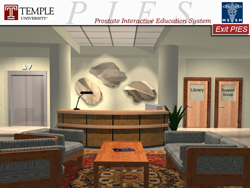|
The Wellness Community put a link to PIES on its education section about prostate cancer in August.
With his collaborator Michael A. Diefenbach, then with the Fox Chase Cancer Center and now director of behavioral research at The Barbara and Maurice A. Deane Prostate Health and Research Center at Mount Sinai School of Medicine in New York, Butz co-developed PIES through a $200,000 grant from the National Cancer Institute in 2002. Additional support came later from the Mt. Sinai School of Medicine, the Pennsylvania Department of Health, and Temple.
Based on an interactive expert system that was previously developed by Butz, director of the Intelligent Systems Application Center in Temple’s College of Engineering, for use as a tutorial program for electrical and computer engineering students, the PIES program provides patients who have been diagnosed with early-stage prostate cancer with information about treatment options and uses the metaphor of a health center to organize and introduce information to its users. Rooms of a health center are presented such as doctor offices, a library, a support group room, and a family room offering different perspectives of prostate cancer treatment. These perspectives allow patients to obtain a variety of information about the disease.
“There is a need for patient information, particularly with prostate cancer, because the patient has the option of several treatment methods such as surgery, radiation or seed implantation,” says Diefenbach. “There are several equivalent treatment options, all of which can potentially have a significant impact on the quality of life of the patient.
“Right now, a lot of patients seek out information from a variety of different sources,” he added. “They go to a web page, they go to the library, talk to friends and family. What our program does is combine a lot of information from various sources and present it in an easy-to-understand, concise manner.”
Butz said when Diefenbach moved from Fox Chase to Mount Sinai, PIES was modified for use by patients at the New York facility, but they are even more pleased it will be used by a wider audience through The Wellness Community.
“We’re very happy that we’ve done something that we feel is good and can be useful to men who have been diagnosed with early-stage prostate cancer,” he said. “Now it is out there for men who go to The Wellness Community web site to use.”
Both Butz and Golant added that they hope the partnership between Temple and The Wellness Community might lead to modifying or adapting the PIES model to other cancers or related information.
“There are some video aspects of the system that make it quite compelling,” Golant said.
|
